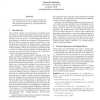Free Online Productivity Tools
i2Speak
i2Symbol
i2OCR
iTex2Img
iWeb2Print
iWeb2Shot
i2Type
iPdf2Split
iPdf2Merge
i2Bopomofo
i2Arabic
i2Style
i2Image
i2PDF
iLatex2Rtf
Sci2ools
102
click to vote
IJCAI
2007
2007
Encoding Closure Operators into Neural Networks
Motivated by basic ideas from formal concept analysis, we propose two ways to directly encode closure operators on finite sets in a 3-layered feed forward neural network.
Related Content
| Added | 29 Oct 2010 |
| Updated | 29 Oct 2010 |
| Type | Conference |
| Year | 2007 |
| Where | IJCAI |
| Authors | Sebastian Rudolph |
Comments (0)

